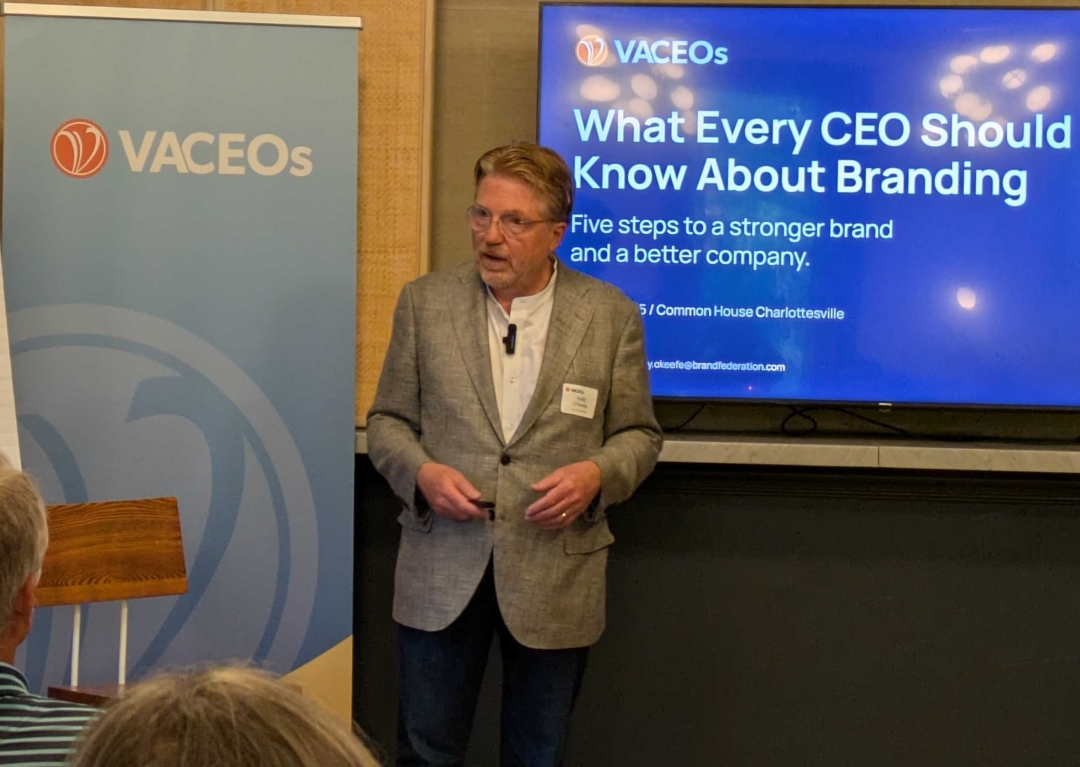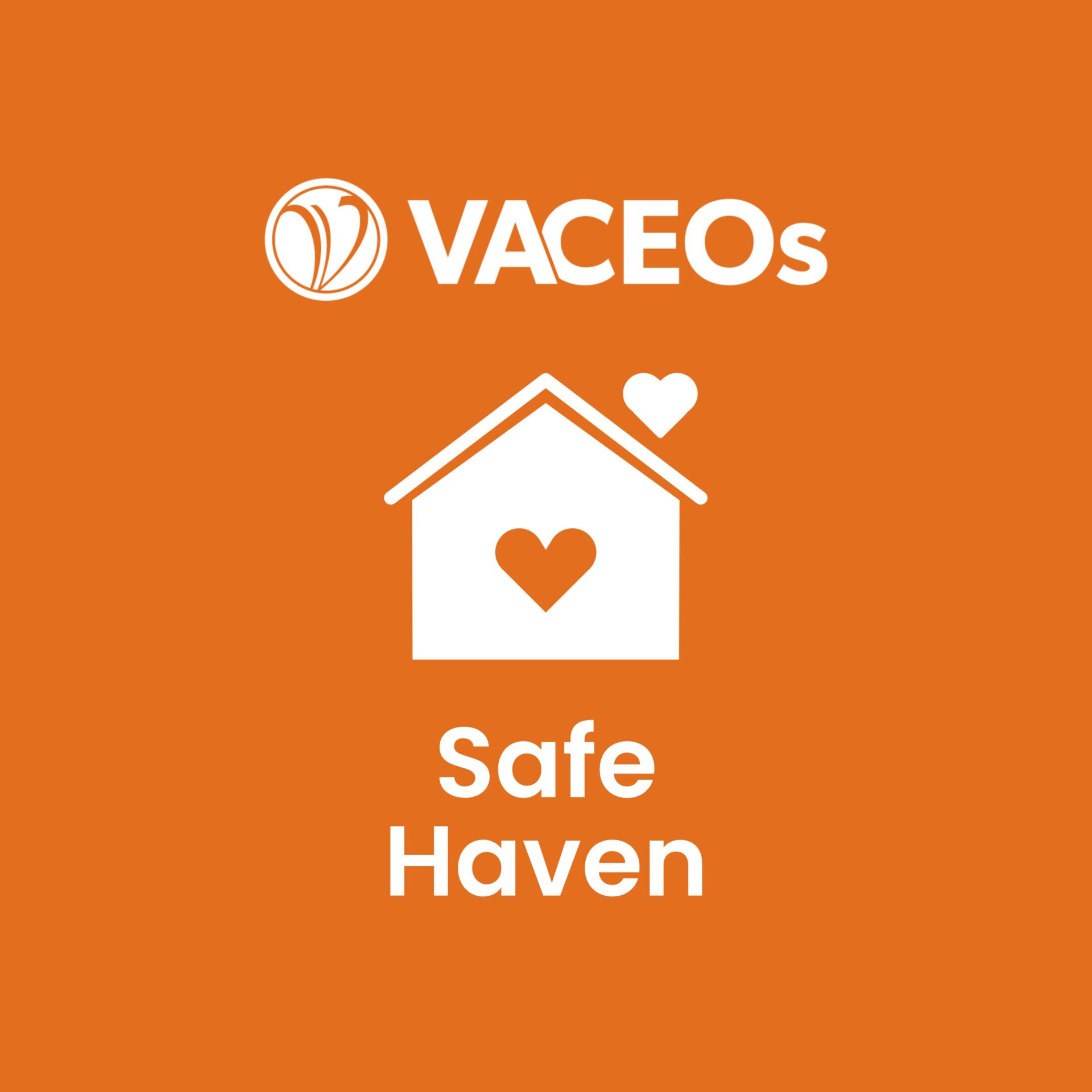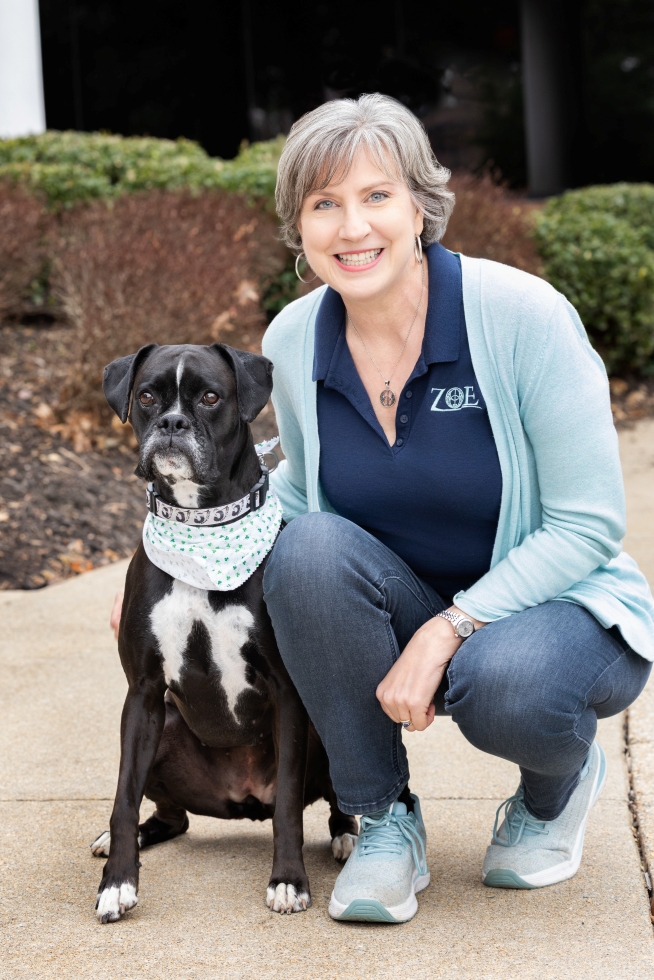What Every CEO Should Know About Branding

We were fortunate to have branding guru Kelly O’Keefe spend the afternoon with a group of CEOs in Charlottesville last week. In addition to building several successful companies (and one failure, which he spoke about candidly), Kelly taught for years at the VCU Brandcenter, helping build its reputation as one of the nation’s premier graduate advertising schools.
Our members sometimes note that learning sessions aren’t always geared to CEOs. They’ve done the 101, 201, and 301 level classes – and have the scars to prove it. Give me 401, or graduate-level content, please! Kelly delivered. For VACEOs folks who couldn’t make it, we recorded the presentation and will make it available in VACEOs Connect.
Kelly’s masterclass for CEOs was too rich to summarize in full, but here are the five core strategies he shared that build the power of brand conviction.
- Clarify Focus
- Simplify Operations
- Unify Culture
- Fortify Loyalty
- Amplify Voice
We noticed that the first three are internal, operational strategies that have nothing to do with marketing or advertising. They are about running a great business.
Kelly showed us that branding is more about what you do than what you say. Think about that as you walk around your organization this week. Your brand is how you – and often your lowest-paid employees – show up for customers every day.
A Safe Haven for CEOs

To an ordinary person, a safe haven is a place, asset, or situation that offers protection and stability during times of crisis or uncertainty. In finance, it refers to investments such as gold or government bonds that retain their value during market downturns. More broadly, it can mean a refuge from physical danger, emotional distress, or political persecution.
But at Virginia CEOs, we talk about Safe Haven in a particular way. It is an environment that we create in our peer roundtables and at events, where CEOs can let their guard down, open up to those around them, and embrace vulnerable conversations.
We asked several members to talk about how they experience Safe Haven at VACEOs. Here is what they said.
Creating a Safe Haven for VACEOs members allows my peers and me to form authentic relationships and eliminates the dread often associated with sales pitches in business networking. Building trusting relationships with members often leads to organic conversations about products and services, but it’s not where it begins.
Safe Haven means keeping the primary focus on the leader, not the business they represent.
Jill Lemon, Sandbox
When I think of Safe Haven in the context of VACEOs, the first thing that comes to mind is the rare freedom to let your guard down. So much of my day-to-day life involves being pitched, sold to, or needing to project confidence even when I don’t feel it.
VACEOs offers something completely different. It’s one of the few places where I don’t feel like anyone’s trying to sell me anything, and I don’t have to perform.
Henry Clifford, Livewire
To me, Safe Haven means showing up to Roundtable meetings and events without having to be on guard — knowing that I’m not being sold to, judged, or sized up. It’s a place where I can be honest about challenges, celebrate wins, and connect with people who genuinely care about my success, not just my business.
Todd Mawyer, TK Promotions
Because of the “Safe Haven” environment, I am able to bring my authentic self to my Forum. This allows me to share my successes and failures. As a result, I am a better leader.
Ron Carey, Tilt Creative + Production
I consider Safe Haven to mean that I can feel free to express and share anything — knowing it will be held in confidence. It is a no-judgment zone. It’s also my responsibility to hear others out completely. We give each other the space to share issues, thoughts, and challenges, knowing they will under no circumstances leave the room. We can all feel free to share without constraint or fear of judgement.
Melissa Ball, Ball Office Products & C.P. Dean Company
Safe Haven means being surrounded by people who genuinely want to help, and know how to do it in the right way. Being able to openly share struggles with peers who truly understand what it’s like to be a CEO has been transformative for me. Not only in business, but also in my personal life.
Bryant Harrison, Seventh Wall
Safe Haven means freedom from pressure – the pressure of hard and soft sales pitches while enjoying the benefits of being a member of Virginia CEOs.
Scott Crawford, Virginia 811
The value of Safe Haven lies in the knowledge that I am surrounded by like-minded CEOs, focused on personal growth and peer support rather than economic gain. This, in turn, means that the comfort level to truly engage my peers is secure.
Member Profile: Yvonne Campbell of ZoeRVA Health

Q: Tell us a little about yourself!
My family moved around frequently. My mother commented once that in their first 23 years of marriage they moved 18 times. Nope, not military. Dad was a preacher.
I attended Mary Washington College, starting when I was 16 yo. I had grandiose dreams of becoming a movie star! But I ended up with a business degree. Then I attended Goddard College, a progressive education college in Vermont where I discovered counseling and psychotherapy in an effort to understand my own life. I ended up becoming an LCSW (licensed clinical social worker). I stayed home when I had my two children, Rebekah and Joseph- this was my favorite job of all time. I returned to work full-time when they went to school.
Q: Please tell us about your journey to becoming a CEO.
After working in private practice, starting a group home and managing a residential treatment center, I recognized the importance of total health including mental, emotional, physical, spiritual and social support. I imagined a practice that could offer clients all of that support in one safe place. I envisioned a group of 5 practitioners working together. I never imagined a group of 70!
Q: Are you working on any new business ideas? AND/OR What’s ahead for ZoeRVA Health that is significant? New initiatives? Growth?
We launched Zoe Primary Care August 2024 so we are working hard to get it soaring! We plan to consolidate from 3 locations to 2 in 2027. We are bringing on a Director of Technology to help us develop some virtual reality tools for therapy and other cutting edge ideas.
Q: How has your Roundtable helped you be more successful as a leader?
My Roundtable introduced me to lots of new ideas and strategies. For example, using virtual assistants has been a game changer.
Q: When you are not leading your business, what do you like to do?
Hike, read, travel, art, film. Mess with my dog, Lux, and my chickens.
What We’re Reading This Summer

When I confessed on LinkedIn that I don’t read business books cover to cover anymore, I didn’t expect the flood of thoughtful replies from leaders across our network. Turns out, I’m not alone!
From audiobooks, to ChatGPT summaries, to the occasional deep dive, leaders in the VACEOs network are reading differently—and often, reading far beyond traditional business topics.
So what are we reading this summer? Here’s what I heard.
Business & Leadership Books (That Actually Deliver)
- Reset by Dan Heath
Recommended by Sarah Milston, who also endorsed:- Who Better Than You and Dreaming Big by Will Packer
- Unreasonable Hospitality by Will Guidara
- The AI-Driven Leader by Geoff Woods
Brittany Toler urges a full read, saying it’s one of the few worth going beyond a summary—ideal for leaders who want to “think forward.” - The Great Game of Business by Jack Stack
Peter Norman calls this “a master class in open-book management” that turns KPIs into a team sport. - The Next Conversation by Jefferson Fisher
Peter Norman also praised this one for its practical insights on navigating tough conversations. Kristin Harrison recommended Fisher’s Instagram. - 10X is Easier Than 2X by Dan Sullivan
Mentioned by Christopher Jones, this is a popular pick this year for those scaling ambitiously. - Slow Productivity by Cal Newport & Hidden Potential by Adam Grant
Aaron Lee found both of these worth a deep dive. - Good to Great and Traction
Bryan Sklar shared that these two books have had the most impact on his business. - The Heart of Business by Hubert Joly
Henry Clifford recommended this, as well as the others below, but only on Audible.
Not Reading—Listening or Summarizing
- Henry Clifford listens exclusively via Audible, saying “No Audible, no book.” His 2025 listens include:
- Demon Copperhead by Barbara Kingsolver
- Let My People Go Surfing by Yvon Chouinard
- Todd Mawyer and others are using ChatGPT and Blinkist to quickly extract business book insights.
- Beth Jacobs adds: “Blinkist dives a little deeper than ChatGPT and still lets you skip around.”
Fiction, Essays & The Inner Life
Many leaders are choosing novels, cultural commentary, and poetry over business books. The humanities for leaders of humans, right?
- James Burke put it plainly: “Novels, plays, literature about humanity… all the lessons are there.”
- Chauncey Jenkins recommended In Praise of Shadows by Junichiro Tanizaki, calling it “a masterclass in vision and identity” that challenges Western modernism.
- Bryant Harrison shared a wide-ranging list, including
- The Art of Gathering by Priya Parker
- Anam Cara and The Inner Landscape by John O’Donohue
- I Will Teach You to Be Rich by Ramit Sethi
- Nicole Mason is inspired by God Is At Work, by Ken Eldred, who built numerous businesses.
- Kim Moss reads a ton of fiction and recommends Remarkably Bright Creatures, by Shelby Van Pelt and Tomorrow, Tomorrow and Tomorrow, by Gabrielle Zevin.
- Laurie Head is reading A Virginia Odyssey: Culture, Community, and Trust by John Thomas.
I Read . . . But
A few final takeaways from the comments:
- Keith Hartman compared most business books to “modern medicine shows”—formulaic and better served in outline form.
- Nick Serfass said – Couldn’t agree more! I’m interested in stories, not lists, steps, or sound bytes.
- Jennifer Tompkins shared a great list of book summary tools at ISBNDB.com.
- Rick Whittington uses ChatGPT to generate summaries and then listens to them podcast-style.
- David Wren and Kelly All find more value in history, fiction, and narrative storytelling than step-by-step business advice.
Your Summer Reading Strategy
Whether you’re lounging at the river or knocking out chapters between meetings, here’s a winning approach:
- Pick one business book to skim deeply or summarize.
- Add one novel, memoir, or cultural essay for balance.
- Try an audiobook on your next drive or walk.
- Use AI summaries to preview before committing.
It turns out, you’re not alone if you can’t finish another 300-page book about habits or frameworks. This summer, read what gives you energy, broadens your perspective, and—if you’re lucky—actually entertains you.
What’s on your summer reading list? Let’s keep the conversation going.
VACEOs Executive Director Scot McRoberts used ChatGPT to summarize comments from his Linkedin post and elsewhere for this blog post.
Collaboration Over Competition: How Businesses Can Amplify Impact Through Purpose-Driven Partnerships

Contributed by Theresa Ceniccola (COO) and Susie Fife (CEO) of Red Orange Studio
Most business leaders are constantly looking for ways to stay one step ahead of the competition. But what if the greatest opportunity for growth isn’t in outpacing others—but in aligning with them?
At Red Orange Studio, we’ve seen firsthand how collaboration over competition can unlock meaningful change. Through our annual PIP (People Inspiring People) Nonprofit Award, we’ve experienced the power of uniting businesses—even those in the same industry—for a shared mission. And the impact has been extraordinary.
The Power of Purpose-Driven Collaboration
Now in its eighth year, the PIP Award provides pro bono branding and marketing services to a deserving nonprofit. But it’s not just a Red Orange initiative. It’s a collaborative effort between several marketing agencies in Richmond and Virginia Beach that closely align with our values. Our PIP Partners include:
Workshop Digital
Brand Federation
CURE
Feedback
Good Run Research & Recreation
Mix + Shine Marketing
Lewis Media Partners
Parkwood Creative
Rian/Hunter Production
Many of our PIP Partner CEOs are VACEOs members, which shows in the way they lead in this level of community impact. Collectively, we donate time, talent, and tools to a nonprofit that wouldn’t otherwise have access to this level of support. It’s a full-scale marketing transformation, powered by collaboration and purpose.
Why It Works (and Why It Matters to Business Leaders)
VACEOs is the perfect example of how leaders can grow together. When we collaborate across industries—or even across perceived competition lines—the results are amplified. And we all gain more than goodwill. We gain:
– Stronger relationships with partners who can support future business goals
– Increased brand visibility as leaders who stands for more than profit
– Deeper team engagement around meaningful work
– Wider community impact with lasting ripple effects
And in times of economic uncertainty, collaboration helps stretch limited resources while boosting innovation.
A Framework for Collaborative Impact
If you’re curious about launching a collaborative effort in your own industry or community, here’s the framework we use to guide our partnerships:
1. Clarity – Align on the “why.” Define the mission before you define the scope.
2. Complement – Choose partners whose strengths differ from your own but whose values align with your company.
3. Communication – Set clear expectations, roles, and responsibilities.
4. Consistency – Treat pro bono work with the same level of professionalism as any other project, defining scope, timeline and quality to build trust and deliver impact.
5. Celebration – take the time to acknowledge every contribution and share the stories of success along the way.
Be the Catalyst
Every collaborative movement needs a spark—and leaders are uniquely positioned to be that catalyst for visionary initiatives. You don’t have to wait for the perfect opportunity or a formal coalition to begin. You can start with a simple idea and a generous invitation.
In our experience, many businesses want to contribute to community-focused partnerships, but they lack the time, resources, or internal capacity to organize something from scratch. By stepping up as the initiator, you remove that barrier—and create space for others to show up and make a difference.
And here’s the truth: leaders who take the first step often become the go-to voice in their industry. You’ll be recognized not only for your values but for your ability to bring people together. It positions your business as a thought leader, a connector, and a community builder—the kind of brand others want to follow, support, and work with.
So ask yourself:
– What community issue do I care deeply about?
– Who are the partners I admire and would love to work alongside?
– What’s one small way we could collaborate for good?
Then make the first call. Send the first email. Share the first idea.
Because when you make it easy for others to say yes, you set the tone for something bigger than business. You extend a generous invitation to be a part of something even bigger.
Let’s redefine what success looks like—not just by how far we go, but by how many we bring with us.
“Alone we can do so little; together we can do so much.” – Helen Keller

Recent Comments